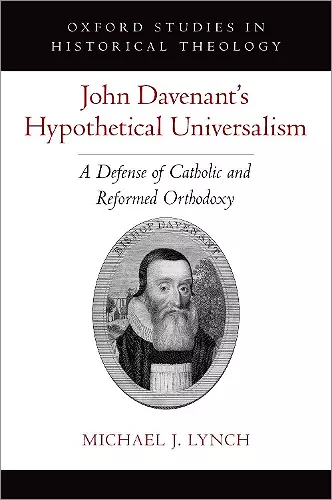John Davenant's Hypothetical Universalism
A Defense of Catholic and Reformed Orthodoxy
Format:Hardback
Publisher:Oxford University Press Inc
Published:8th Oct '21
Should be back in stock very soon

Recently there has been a revival of interest in the views held by Reformed theologians within the parameters of confessional orthodoxy. For example, the doctrine known as 'hypothetical universalism'--the idea that although Christ died in some sense for every person, his death was intended to bring about the salvation only for those who were predestined for salvation. Michael Lynch focuses on the hypothetical universalism of the English theologian and bishop John Davenant (1572-1641), arguing that it has consistently been misinterpreted and misrepresented as a via media between Arminian and Reformed theology. A close examination of Davenent's De Morte Christi, is the central core of the study. Lynch offers a detailed exposition of Davenant's doctrine of universal redemption in dialogue with his understanding of closely related doctrines such as God's will, predestination, providence, and covenant theology. He defends the thesis that Davenant's version of hypothetical universalism represents a significant strand of the Augustinian tradition, including the early modern Reformed tradition. The book examines the patristic and medieval periods as they provided the background for the Lutheran, Remonstrant, and Reformed reactions to the so-called Lombardian formula ('Christ died sufficiently for all, effectually for the elect'). It traces how Davenant and his fellow British delegates at the Synod of Dordt shaped the Canons of Dordt in such a way as to allow for their English hypothetical universalism.
This is scholarship of a remarkably high calibre, and a very important contribution to the field of early modern Reformed theology. Its contents merit close attention, and its method, clarity, and precision are worthy of emulation. * Jake Griesel, George Whitefield College, Cape Town, South Africa, Evangelical Quarterly *
This monograph is a clear example of how to do nuanced, historically sound research...This is essential reading for any serious student of the early modern era of Reformed orthodoxy, John Davenant, or the richly diverse Reformed tradition. * Thomas Haviland-Pabst, One Family Ministries, Asheville, NC, USA, Journal of Reformed Theology *
Lynch's study makes a substantive contribution to scholarship on the historic breadth of the Reformed tradition, arguing for the catholic, Augustinian, and Reformed credentials of Davenan's hypothetical universalist account of the extent of the atonement. Modern Reformed Anglicans will find it a useful means by which to consider the compatibility of hypothetical universalism with their own confessional standards (cf. Article 31), and with early Reformed orthodoxy more broadly. * Matthew N. Payne, Global Anglican *
With this slim but punchy volume Michael Lynch has provided students of theology with a piece of very solid scholarship on an important figure and his contribution to a surprisingly understudied topic: the doctrine of the atonement in early modern Reformed theology. * Sam Bostock, Modern Reformation *
Lynch's erudite and well-sourced exposition of Davenant's hypothetical universalism should be of great interest to all Christians, but especially those who aspire to be both Reformed and catholic ... Lynch's careful and informative treatment will not disappoint. * James Clark, North American Anglican *
Not only does Michael Lynch here provide an accomplished reassessment of John Davenant's 'hypothetical universalism,' but he also argues for a major rethinking of this issue within the Christian theological tradition. This is a work brimming with new discoveries and insights that should change how historians of Reformed theology approach a whole range of theologians and related issues. This is original work of the greatest importance. * Anthony Milton, Professor of History, University of Sheffield *
Michael Lynch's closely argued but engaging study offers what is undoubtedly the most sophisticated analysis of Davenant's hypothetical universalism currently available. Approaching Davenant's theology through a deftly-drawn background of medieval and early Reformation thought on the atonement, as well as a revelatory account of the British Delegation's activity at the Synod of Dort, Lynch puts together a compelling case that Davenant's hypothetical universalism should be considered a well-rooted variant within, rather than a deviation from, Reformed Orthodoxy. This learned and informative discussion will repay careful consideration by scholars of the English Church and the wider Reformed Tradition alike. * Stephen Hampton, Dean of Peterhouse, Cambridge *
It is arguable that in no other area of Reformed theology has the debate about its development proved more tricky and more contentious, and more difficult to separate historical analysis from later polemics, than the atonement. That fact alone makes Michael Lynch's study of John Davenant a signal achievement. Lynch successfully demonstrates that Davenant's thought can only be understood when his work is allowed to speak for itself. This book is a significant contribution to the growing body of scholarship on Reformed Orthodoxy, a welcome analysis of a key but neglected Reformed theologian, and a great example of how to do historical theology. * Carl R Trueman, Professor of Biblical and Religious Studies, Grove City College *
Lynch's work is a monumental contribution to scholarship on the Atonement and the Reformed tradition. * Jonathan N. Cleland, Theology and History *
ISBN: 9780197555149
Dimensions: 236mm x 157mm x 20mm
Weight: 522g
268 pages